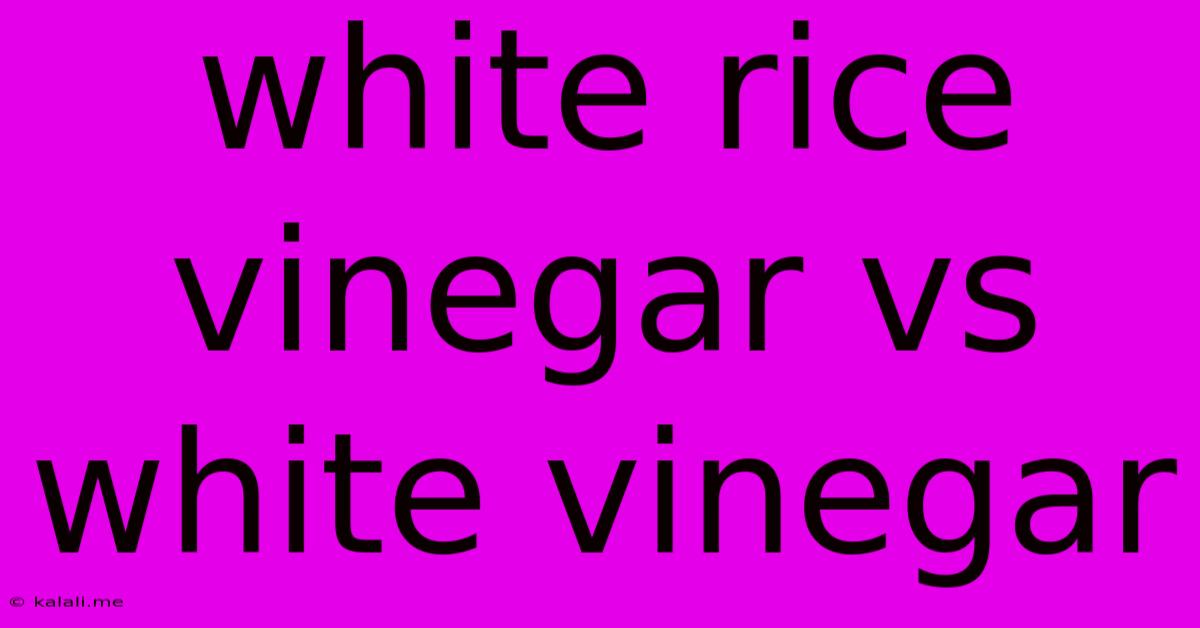White Rice Vinegar Vs White Vinegar
Kalali
May 22, 2025 · 3 min read

Table of Contents
White Rice Vinegar vs. White Vinegar: Unveiling the Differences
Choosing between white rice vinegar and white vinegar might seem simple at first glance, but these two seemingly similar ingredients offer distinct flavor profiles and culinary applications. Understanding their differences can elevate your cooking and pickling game significantly. This article delves into the nuances of each, highlighting their unique characteristics and best uses.
What's the Difference?
The primary difference lies in their production process and resulting flavor. White vinegar, often distilled white vinegar, is made by fermenting a grain mash (typically corn, barley, or potatoes) and then distilling the resulting solution. This process removes much of the original grain's flavor, leaving a sharp, acidic taste. White rice vinegar, on the other hand, is made from fermented rice. This gentler fermentation process retains a subtle sweetness and a milder, less harsh acidity compared to its distilled counterpart.
Flavor Profile Comparison:
- White Vinegar: Pungent, sharp, and acidic. Its clean taste makes it ideal for applications where you want a strong vinegar bite without other competing flavors.
- White Rice Vinegar: Mildly sweet and tangy, with a delicate, slightly nutty undertone. Its subtle flavor adds brightness without overpowering other ingredients.
Culinary Applications:
While both can be used interchangeably in some instances, their unique characteristics lend themselves to specific uses:
White Vinegar:
- Cleaning: Its strong acidity makes it a potent cleaning agent for various household purposes.
- Pickling: Perfect for creating aggressively tangy pickles, where a bold vinegar flavor is desired.
- Marinades: Its sharp taste can tenderize meat and add a vibrant acidity to marinades.
- Salad dressings: Can be used in dressings but may overpower delicate ingredients.
- Baking: Occasionally used in baked goods for leavening or to balance sweetness.
White Rice Vinegar:
- Asian Cuisine: An indispensable ingredient in many Asian dishes, particularly Chinese, Japanese, Korean, and Vietnamese cooking. It's often used in stir-fries, sauces, marinades, and dressings.
- Sushi Rice: Crucial for seasoning sushi rice, imparting a subtly sweet and tangy flavor.
- Pickling: Ideal for creating milder, less acidic pickles, allowing the flavors of the vegetables to shine.
- Salad Dressings: Adds a brighter, more delicate acidity than white vinegar, complementing a wider variety of ingredients.
Nutritional Differences:
While both vinegars are low in calories and carbohydrates, white rice vinegar may contain small amounts of minerals such as potassium, depending on the production method. However, nutritional differences are generally negligible in terms of cooking application.
Which One Should You Choose?
The best choice depends entirely on your intended use. If you need a strong, assertive vinegar flavor, white vinegar is the clear winner. If you prefer a milder, sweeter, and more nuanced taste, white rice vinegar is the better option. Consider the other ingredients in your recipe and aim for a flavor balance that complements rather than clashes. Experimentation is key to discovering your preferences!
In Summary: While both white vinegar and white rice vinegar serve as versatile kitchen staples, understanding their unique characteristics will enable you to make informed decisions and enhance your culinary creations. Knowing the subtle differences between these two vinegars will significantly improve your cooking.
Latest Posts
Latest Posts
-
How To Add Html To Google Docs
May 23, 2025
-
How To Open Garage Door From Outside
May 23, 2025
-
How To Get The House In Riften
May 23, 2025
-
Carriage Return With Mouse Paste Iterm2
May 23, 2025
-
Is Itc Avant Garde A Web Based Font
May 23, 2025
Related Post
Thank you for visiting our website which covers about White Rice Vinegar Vs White Vinegar . We hope the information provided has been useful to you. Feel free to contact us if you have any questions or need further assistance. See you next time and don't miss to bookmark.